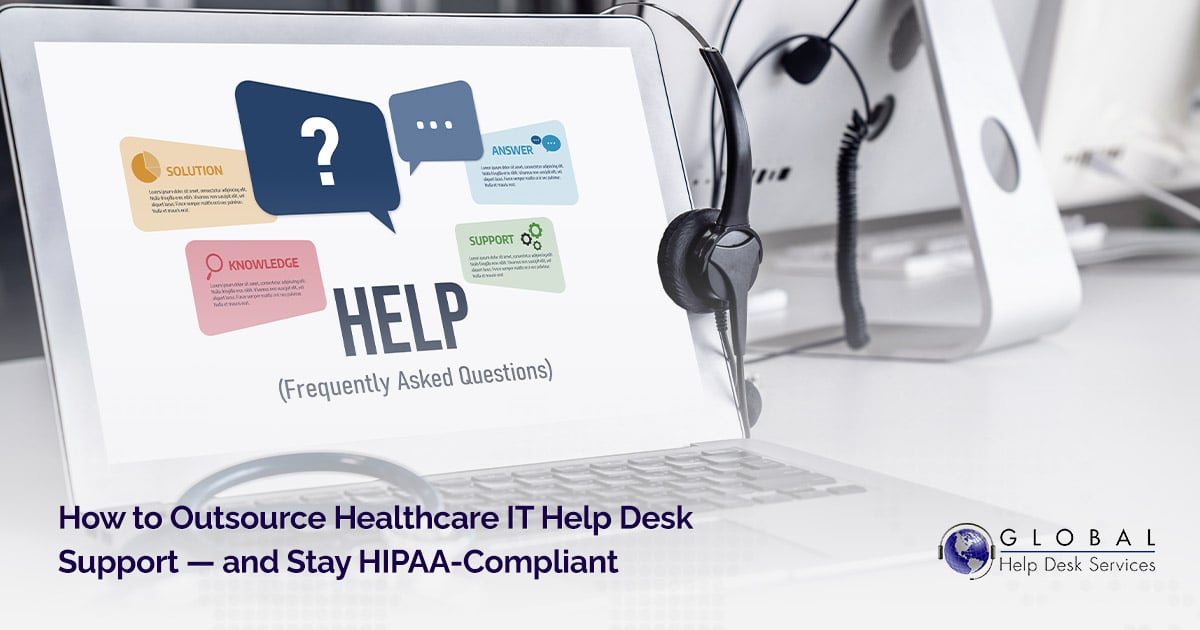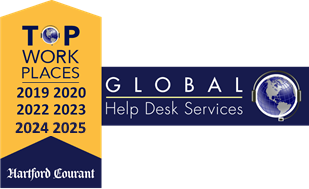In healthcare settings, IT problems don’t just happen at a desk — they happen in exam rooms, ICUs, and ORs. And when lives are on the line, staff can’t wait on hold. If your IT support desk is overwhelmed, it opens a Pandora’s Box of risks to your entire organization and, most importantly, to patient care.
But outsourcing comes with risks as well: “Will they know our systems?” “Do they have the skills we need?” “Can we work with them and still stay compliant?”
How can you tell your potential help desk vendor is up to the task?
What to Look for in Outsourced Healthcare IT Help Desk Partners
A good healthcare IT help desk support partner can prove they have prior experience in healthcare and that they’ll work with you — not against you — to quickly provide care for your patients.
Look for Familiarity With Clinical Hardware and Software
Your help desk partner should “speak the language” of healthcare IT — because when clinicians call for help, they don’t have time to explain why a surgeon needs access to an image now. They want to know that you can either fix it or get someone to fix it immediately.
Your help desk partner should work with you to develop Knowledge Base (KB) articles that their agents can use to resolve or process incidents quickly and efficiently.
Look for vendors with direct experience with:
- Major EHR platforms (Epic, Cerner, MEDITECH, etc.)
- Imaging and diagnostic tools (PACS, RIS)
- Pharmacy management systems and automated dispensing
- Clinical communications platforms (Dragon)
- Surgical and bedside equipment integration
- WoWs
- Label printers
- Wristband printers
- Medication scanners
Look for Responsible Customer Service
Every minute spent waiting for IT support is a minute that care is delayed, workflows are disrupted, and staff get more frustrated.
The big thing: Make sure your outsourced help desk clearly assesses precisely what they can and cannot handle, and precisely where those handoff points are. So, nobody is wasting time with things that the help desk should not be doing – it moves along quickly, cut and dry.
High-performing help desks recognize this. They build workflows that distinguish between routine and life-critical tickets. They train staff to act fast, escalate intelligently, and stay available — 24/7/365. They measure what matters — and hit their targets.
At a minimum, vendors should meet or exceed the following KPIs:
- Call answer time: Expect calls to be answered in under one minute
- Call abandonment rate: Look for a benchmark below 5%
- First-contact resolution rate: You don’t want staff stuck in limbo waiting for a tech issue to be resolved. Ideally, the first-contact resolution rate should be over 85%.
These numbers aren’t just vanity metrics—they’re the difference between frontline workers getting the help they need or turning to workarounds that risk safety and compliance.
Make sure your vendor’s metrics can be verified and available on request.
Look for HIPAA-Compliant IT Support Services
Every help desk interaction in healthcare potentially involves protected health information (PHI). That makes privacy and security crucial for compliance and trust.
A qualified healthcare IT support vendor should have rigorous safeguards in place for how tickets are logged, how screens are shared, and how data is stored and transmitted. Because if there’s a data breach, it will be your facility’s reputation on the line. You’ll face more than just a hefty fine. You’ll lose the trust of your patients.
Take this example:
At one hospital we support, our help desk started getting multiple calls from the same nursing station within minutes. Something seemed off, so instead of just treating each call as a separate ticket, our team connected the dots and realized something was very wrong. They immediately told the nurse to disconnect that computer from the network and got our desktop support team involved right away.
This move thwarted an attempted ransomware attack that could have locked down systems across the entire hospital if it had spread.
How do you know your IT help desk vendor will act to protect your sensitive data? Ask them for:
- Proof of HIPAA compliance and regular audits
- Staff training and certification in handling PHI
- Secure systems for ticketing, remote access, and documentation
In short, it’s not enough to assume your vendor is HIPAA-compliant. You have to verify it.
How GHDSi Guarantees HIPAA Compliance
All agents have to go through standard online HIPAA Awareness training and pass a test. Those certificates are stored so they are accessible to our Compliance Officer.
All Team Leaders have to go through both the HIPAA Awareness training and HIPAA Security training.
All employees have to go through internal security training related to protecting Protected Health Information (PHI) and Personal Identifiable Information (PII) and they must pass a quiz with 100% score.
Look for an It Help Desk Provider Who Provides a True Partnership
It’s key for your outsourced IT help desk partner to stay abreast of what’s happening with your business – and to keep you updated on anything that could affect your operations.
Typically, if there are any major hardware/software updates that impact the help desk then customers include us in meetings that discuss the changes (typically their CAB meetings). They’ll either run the CAB and let us know the changes, or they’ll have us sit in, so we can discuss any changes and their impact on the user community. That information is communicated to the agents and often results in knowledge base updates.
Ask how your provider will stay on top of your needs … and take careful note of their answers.
The Ripple Effect of Freeing Up Overburdened Internal IT Teams
In-house IT teams weren’t hired to reset passwords — they were hired to build and secure the future of your infrastructure. Yet they're often bogged down in simple first-tier support incidents rather than managing infrastructure, rolling out tools and upgrades, and responding to security threats.
Offloading first-tier support like password resets and basic troubleshooting frees up their time to focus on strategic priorities that drive long-term value.
The impact of that shift can be significant:
- Improved IT team morale and retention: When internal teams are stuck in reactive mode — resetting passwords or fielding printer issues — they burn out fast. Offloading those tickets to a qualified partner helps your staff focus on strategic work, which leads to higher job satisfaction and lower turnover.
- Accelerated innovation projects: Healthcare tech leaders like you are under constant pressure to modernize infrastructure, implement new clinical technologies, and improve cybersecurity. But those projects often get pushed aside when teams are buried in day-to-day support. With the help desk handled, your team can actually move those big initiatives forward.
- Reduced burnout and turnover: Repetitive tasks and high-pressure environments take a toll. Giving internal staff a break from constant alerts and low-level tickets helps reduce stress, improve mental health, and increase retention — especially in an industry already facing workforce shortages.
- A more focused and effective tech environment: When every team member is working at the top of their game, tech operations become more streamlined. Resources go further, projects finish faster, and your overall IT function becomes more strategic and efficient.
In short, a trusted help desk partner can do more than support your users; they can also support your people and lead to better outcomes for your patients.
And of course, there’s the question of compliance:
How HIPAA-Compliant IT Support Delivers Real ROI
Some healthcare decision-makers still view help desk outsourcing as a cost center — just another line item. But it’s not hard to show them that with the right partner, the help desk becomes a strategic investment that delivers measurable returns across operations, compliance, and even revenue.
Here’s how:
Reducing system downtime and costly delays: When clinical systems go down, your staff can’t deliver the care patients need. A responsive, healthcare-savvy help desk reduces downtime, ensuring that staff can access what they need — when they need it — without long waits or workarounds that disrupt care and frustrate clinicians.
Extending the life of existing IT infrastructure: Routine support and consistent troubleshooting help prevent small issues from becoming big (and expensive) ones. A reliable help desk ensures technology investments last longer and perform better, delaying the need for costly replacements or upgrades.
Minimizing the risk of HIPAA violations: Every call to the help desk has the potential to involve sensitive patient data. A vendor that understands HIPAA inside and out — and trains their staff accordingly — helps protect your organization from compliance breaches that can result in fines, lawsuits, and reputational damage.
Supporting billing and documentation processes that impact reimbursement: Downtime in EHR systems or documentation delays can cause errors in billing or missed revenue opportunities. A responsive support team keeps these systems running smoothly, helping ensure documentation is accurate and reimbursement isn’t left on the table.
A well-run help desk doesn’t just fix tech problems — it helps protect revenue, reduce risk, and enable better patient care. That’s an ROI worth paying attention to.
Read more: How Help Desk Support Gives Health-Care Providers More Time to Focus on Care
Examples of Successful Outsourced IT Help Desk Support in Healthcare
Many healthcare organizations worry that outsourcing help desk support will cause disruption, confusion, or delays. The reality, when done right, is the opposite.
Take some of our recent success stories:
- A Midwestern health system faced a critical EMR outage. Our agents recognized the patterns of calls/tickets coming in, analyzed what callers were reporting, followed escalation processes, and paged the key onsite teams to restore operations with the clinical system, ensuring patient safety and fast recovery.
- A radiologist called in reporting that his image viewer software was not launching properly. It was getting stuck on connecting and not fully loading. The agent was able to quickly assess the fix needed so that the radiologist was able to view the MRI image immediately for a STAT case for a patient in the ER that was involved in an accident.
- Donor services called in to be able to access a clinical system to perform a life-saving procedure. They could not login to initiate approvals for this — their account was disabled. We immediately followed the escalation process outlined by the customer and reached the appropriate person that could re-enable the account. A resolution was put in place quickly so we could assist them in logging in. There was minimal delay, and the patient was able to receive an organ for a life-saving procedure
These results don’t happen by accident. They happen because the right vendor understands what’s at stake in healthcare — and shows up every day to protect it. That’s why choosing the right vendor is so important.
Read more: Success Story: Improving Efficiency in Healthcare Help Desk Operations
Make IT Support a Strategic Advantage
When you’re facing rising demands, tighter budgets, and growing complexity, help desk support might seem like just another box to check.
But you should view it as a strategic choice for your facility’s future.
By choosing a vendor that understands clinical urgency, meets performance benchmarks, and supports your internal teams, you’re investing in more than just faster ticket resolution:
- You’re helping strengthen patient safety by ensuring critical systems stay online when they’re needed most.
- You’re making smarter use of resources by reducing downtime, avoiding unnecessary IT hires, and extending the life of existing infrastructure.
- Your staff benefits, too — with less frustration, fewer delays, and a more seamless experience when technology works the way it should.
The result? Measurable improvements across your operations, from care delivery to compliance and beyond.
Healthcare is changing fast. The help desk can help you lead the change — not slow it down.
Have questions about how we can support your healthcare IT needs? Get in touch.


